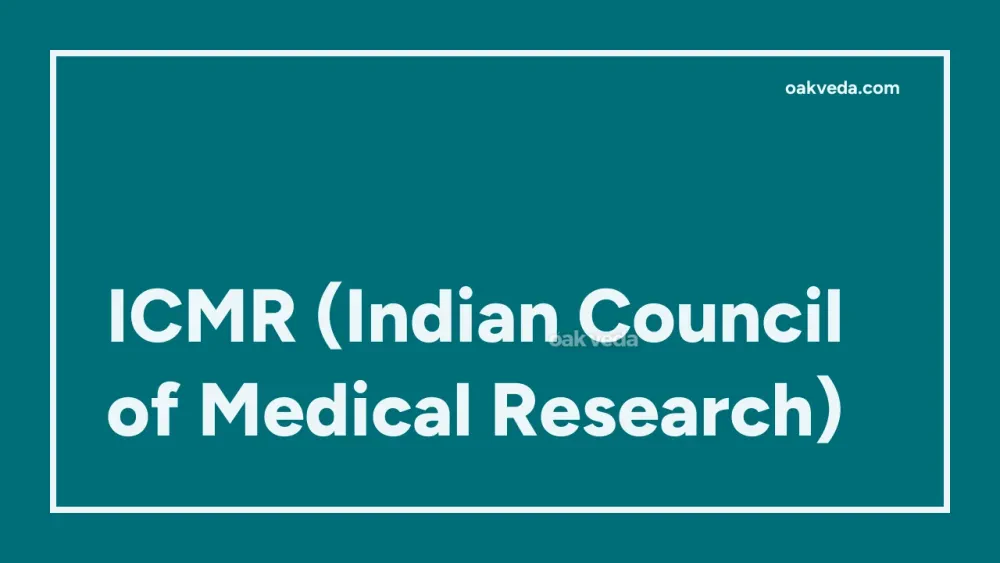
What is the Full Form of ICMR?
ICMR is the abbreviated form of the Indian Council of Medical Research. This premier biomedical research organization plays a crucial role in promoting and coordinating medical research across India.
What is Indian Council of Medical Research?
The Indian Council of Medical Research (ICMR) is India's apex body for the formulation, coordination, and promotion of biomedical research. Established under the Ministry of Health and Family Welfare, ICMR serves as the country's leading institution for medical research and innovation.
Origin and Development of ICMR
The roots of ICMR can be traced back to the early 20th century:
- 1911: The Indian Research Fund Association (IRFA) was established to promote and coordinate medical research in India.
- 1949: IRFA was reorganized and renamed as the Indian Council of Medical Research, significantly expanding its scope and activities.
- Post-Independence: ICMR underwent several changes to align with the nation's health priorities and research needs.
Today, ICMR operates through a network of 26 specialized institutes and six regional centers, each focusing on specific health issues and research areas.
How does ICMR work?
ICMR functions as a autonomous body under the Department of Health Research, Ministry of Health and Family Welfare. It operates through:
- Research Institutes: 26 specialized institutes focusing on various health topics.
- Regional Centers: Six centers addressing regional health issues and building research capacity.
- Collaborations: Partnerships with national and international organizations, universities, and research institutions.
- Funding: Providing grants and fellowships for medical research projects.
- Policy Guidance: Advising the government on health policies and research priorities.
Functions of ICMR
The Indian Council of Medical Research performs several vital functions:
- Research Promotion: Encouraging and supporting biomedical research across India.
- Capacity Building: Developing skilled researchers and state-of-the-art research facilities.
- Knowledge Dissemination: Publishing research findings and health information for professionals and the public.
- Health Policy Guidance: Advising the government on health-related issues and policies.
- Disease Surveillance: Monitoring and studying disease patterns and outbreaks.
- Technology Development: Fostering innovation in diagnostics, treatments, and preventive measures.
Applications of ICMR Research
ICMR's research finds applications in various areas of public health:
- Disease Control: Developing strategies to combat infectious diseases like tuberculosis, malaria, and HIV/AIDS.
- Nutrition: Addressing malnutrition and promoting healthy dietary practices.
- Maternal and Child Health: Improving reproductive health and reducing infant mortality.
- Non-Communicable Diseases: Researching cancer, diabetes, and cardiovascular diseases.
- Environmental Health: Studying the impact of environmental factors on human health.
- Traditional Medicine: Exploring the potential of Ayurveda, Yoga, and other traditional healing systems.
Features of ICMR
Key features that distinguish ICMR include:
- Comprehensive Research Network: A vast network of specialized institutes covering diverse health topics.
- Multidisciplinary Approach: Integrating various scientific disciplines for holistic research.
- International Collaborations: Partnerships with global health organizations and research institutions.
- Ethical Research Practices: Ensuring adherence to ethical guidelines in medical research.
- Rapid Response Capability: Quick mobilization of resources during health emergencies.
- Open Access Publications: Making research findings freely available to the scientific community and public.
Benefits of ICMR
ICMR's work has significantly benefited India's healthcare landscape:
- Improved Public Health: Contributing to the control and prevention of various diseases.
- Evidence-Based Policies: Providing scientific data for informed health policy decisions.
- Indigenous Solutions: Developing cost-effective interventions suited to Indian conditions.
- Skilled Workforce: Training and nurturing a pool of talented medical researchers.
- Global Recognition: Enhancing India's reputation in the international scientific community.
- Health Equity: Focusing on health issues affecting vulnerable and marginalized populations.
Limitations or Challenges of ICMR
Despite its achievements, ICMR faces several challenges:
- Funding Constraints: Limited resources compared to the vast health research needs.
- Infrastructure Gaps: Uneven distribution of research facilities across the country.
- Brain Drain: Losing talented researchers to better-funded international institutions.
- Bureaucratic Hurdles: Administrative delays affecting research progress.
- Translational Gaps: Difficulties in translating research findings into practical applications.
- Emerging Health Threats: Keeping pace with rapidly evolving health challenges like new infectious diseases.
Future Developments in ICMR Research
ICMR is poised for significant advancements in the coming years:
- Precision Medicine: Tailoring treatments based on individual genetic profiles.
- Artificial Intelligence: Leveraging AI for disease prediction and drug discovery.
- Genomics Research: Exploring the Indian genome for population-specific health insights.
- Climate Change and Health: Studying the health impacts of environmental changes.
- One Health Approach: Integrating human, animal, and environmental health research.
- Digital Health: Developing and evaluating telemedicine and m-health interventions.
FAQs on ICMR Full Form
-
What is the full form of ICMR? The full form of ICMR is Indian Council of Medical Research.
-
When was ICMR established? ICMR was established in 1949, evolving from the Indian Research Fund Association founded in 1911.
-
Where is ICMR headquarters located? ICMR headquarters is located in New Delhi, India.
-
How many institutes does ICMR have? ICMR operates through 26 specialized institutes and six regional centers across India.
-
What are the main focus areas of ICMR? ICMR focuses on various health research subjects including infectious diseases, nutrition, reproductive health, environmental health, and non-communicable diseases.
-
Is ICMR a government organization? Yes, ICMR is a government-funded autonomous body under the Ministry of Health and Family Welfare, Government of India.
-
How does ICMR contribute to public health in India? ICMR contributes through research, policy guidance, disease surveillance, technology development, and capacity building in the field of medical research.
-
Can researchers apply for funding from ICMR? Yes, ICMR provides grants and fellowships for various medical research projects and programs.
-
Does ICMR collaborate with international organizations? Yes, ICMR collaborates with various international health organizations and research institutions for global health initiatives.
-
How can I access ICMR's research publications? ICMR follows an open access policy, and many of its research publications are freely available on its official website and in scientific journals.
You may be interested in:

